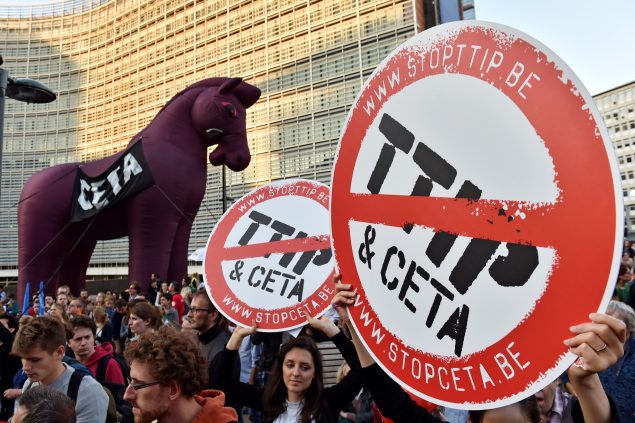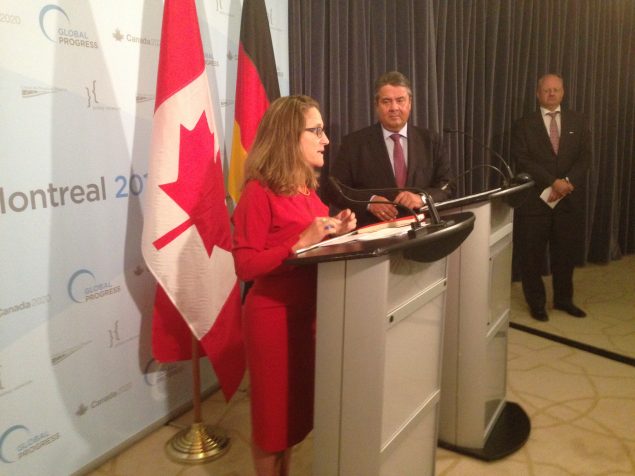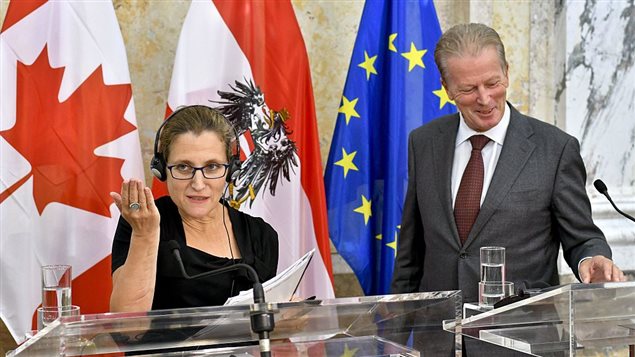Canada and the European Union will draft a legally binding declaration to try to assuage growing concerns over their free trade deal, EU officials announced today in the Slovak capital of Bratislava.
“It is a modern trade agreement with a country which shares our values and it’s also important from the economic and strategic viewpoint,” Slovak Economy Minister Peter Ziga said after chairing talks by EU trade ministers in Bratislava, which was also attended by Canada’s International Trade Minister Chrystia Freeland.
Freeland was invited to a dinner of trade ministers Thursday evening and had a chance to meet her EU colleagues and answer their questions about the Comprehensive Economic and Trade Agreement (CETA), Ziga said.
“We have had a very interesting and excellent discussion about this agreement,” Ziga said.
The free trade deal, which would eliminate 98 per cent of tariffs, allowing the free flow of goods and services between Canada and EU member states, was agreed in principle in 2014 and is undergoing a legal review.
Growing opposition

Thousands of people demonstrate against the Transatlantic Trade and Investment Partnership (TTIP) and the EU-Canada Comprehensive Economic and Trade Agreement (CETA) in the centre of Brussels, Belgium September 20, 2016. Reuters/Eric Vidal
But it has run into growing grassroots opposition both in Canada and the EU, where it’s seen as a precursor to a much larger free trade deal with the United States, the Transatlantic Trade and Investment Partnership (TTIP) that is still being negotiated.
German activists have taken their protest against CETA to the country’s Constitutional Court, arguing that CETA runs counter to the constitution and the rule of law. Last week, an estimated 320,000 rallied across Germany to protest the two deals.
Ziga acknowledged that there are some issues that are perceived by the public as “extremely sensitive.”
“That being the case we agreed that the European Commission would prepare a joint declaration, which will explain the controversial issues, for example, public services, investment protection, the investment court system, and also work on the environmental standards,” Ziga said.
The document will be presented to an extraordinary council of EU trade ministers on October 18, Ziga said.
Canadian officials speaking on condition of anonymity confirmed that the joint declaration will have to be ready by then.
‘Smoke and mirrors’
Maude Barlow, the chairperson of the Council of Canadians, a non-profit citizens’ advocacy group that has campaigned against the free trade deal, dismissed the declaration as “smoke and mirrors.”
“The only way anything can be legally binding is if they reopen the treaty itself and make the changes there,” Barlow said. “A declaration outside of CETA is meaningless and meant to assuage the growing concerns about this deal.”
While the declaration talks about protecting public services, CETA contains “standstill” and “ratchet” clauses that clearly say that once “liberalized,” a service cannot be returned to public management, Barlow said.
“And the investor court they have agreed on still gives foreign corporations the right the challenge rules and standards they don’t like,” Barlow said. “This is all for PR and won’t work.”
To really assure the ability to regulate, protect public services and ensure worker rights would require at the very least, carving the Investor-State Dispute Settlement (ISDS) instrument, regulatory cooperation and ratchet and standstill clauses out of CETA altogether, Barlow said. But that would mean reopening the negotiations and both Canada and EU refuse to do that.
‘New generation trade agreement’

Canada’s International Trade Minister Chrystia Freeland and German Vice Chancellor and Economy Minister Sigmur Gabriel answer questions from reporters in Montreal, on Sept. 19, 2016. Levon Sevunts/Radio Canada International
Following a recent meeting with German Vice Chancellor and Economy Minister Sigmur Gabriel, Freeland said CETA upholds and promotes progressive values that Canadians and Europeans share.
“We agreed that CETA is a progressive, new generation trade agreement, which strongly enshrines labour and environmental rights, which strongly enshrines the role of public services and the right of states to regulate,” Freeland said, speaking at a joint press conference with Gabriel on the sidelines of Global Progress 2016 conference in Montreal. “We spoke about the new investment chapter in CETA, which is a new way of organizing dispute settlement agreed for the first time between Canada and Europe.”
The agreement will revolutionize the current system on investment protection, Gabriel said.
Speaking in Bratislava today, EU Trade Commissioner Cecilia Malmstrom praised the government of Prime Minister Justin Trudeau.
“The Canadian government has been very forthcoming to try to work with us in order to clarify some issues and make sure that all countries will feel in a position to ratify this agreement,” Malmstrom said. “We are now very close to that.”
The EU hopes to sign the deal when Trudeau visits on October 27, Ziga said.
After the agreement is signed, the European Parliament would need to approve it before parts of the deal can provisionally enter into force.
Long process ahead
Some controversial provisions will not come into effect until the agreement is fully ratified – a process that could take several years. This is likely to include the planned creation of a tribunal for disputes involving investors, Malmstrom said.
She predicted that the rest could provisionally come into effect early next year if all goes according to plan.
The EU’s credibility is at stake here as a negotiating partner, as is its trade policy, Ziga warned.
“If it is not possible for the EU to reach an agreement with Canada, given the market with 356 million citizens, then it would be hard to imagine with what country it would be possible to reach an agreement given the closeness between the counties in terms of cultural values and other values too.”







For reasons beyond our control, and for an undetermined period of time, our comment section is now closed. However, our social networks remain open to your contributions.